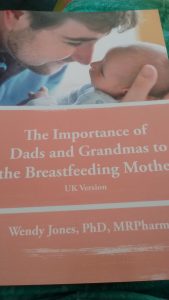The recent Time article has provoked quite a controversy, not least (in my opinion) the decision not to use that cover in the UK. According to The Guardian, this controversy about a photograph of a mother breastfeeding her 3 year old constitutes a ‘backlash against breastfeeding,’ and at the weekend they published Zoe Williams’ wide-ranging thoughts on this matter.
Williams’ article is littered with factual errors, assumptions, judgemental remarks, and references to ‘protests’ that never actually happened. She refers to extended breastfeeding in the first paragraph, but then goes on to discuss ‘breast is best,’ attachment parenting and government policy on health promotion, without ever coming back to her initial, rather impolite remarks that breastfeeding advocates are ‘evangelical to the point of dogmatism,’ and that she thinks we think ‘extended breastfeeders make [us] all look a bit weird,’ and that this is why we don’t discuss extended breastfeeding very much. In fact, we don’t discuss it much because it doesn’t happen much. If fewer than 2% of babies in the UK are exclusively breastfed at six months, just try and quantify the number who still get any breastmilk at all by the age of three years.
Williams goes on to dismiss the ‘benefits’ of breastfeeding as mostly syllogistic, methodologically flawed, and generally ignored by parents, while also noting that “I didn’t care whether of not the health benefits were real, I’d do it again even if it made the baby’s IQ go down,” thus negating the point of her entire argument against the ‘benefits’ of breastfeeding: like most mothers, she is not basing her decision on health or any other benefits. Mothers are biologically driven to nurture their young.
I use the term ‘benefits’ very cautiously. Breastfeeding is the baseline; it is formula milk that needs to prove its case. Research into breastfeeding may be methodologically flawed (because how can you carry out randomised controlled trials on babies?), but there is certainly no robust research showing health benefits for formula. As for the research, Analytical Armadillo has recently posted an excellent round-up of some very current research from a number of peer-reviewed journals. Williams’ guru in this matter is one Joan Wolf, who supports her view of parenting as a world of extremes, without nuance.
Moving on to attachment parenting, Williams quotes feminist criticism of co-sleeping which describes “putting the child in the bed between the father and the mother.” This is an unsafe practice, and UNICEF guidelines for safe co-sleeping can be found here. The feminist angle here seems pretty spurious, pitting notional extremes of motherhood against each other. Feminism, surely, means we all have the right to choose our own pathway?
Mothers do not divide neatly into two camps: Breastfeeding Mothers versus Formula Feeding Mothers. As Williams points out, the majority of mothers in the UK do initiate breastfeeding (though she quotes an imaginary 91%; the most recent Infant Feeding Survey gives an initiation rate of 81%). NHS South Central provides some interesting data on duration of breastfeeding; locally, we have a high initiation rate of 88%, down to 79% by five days, 72% at two weeks, and just 58% of mothers are still breastfeeding at six weeks. Therefore most of the mothers in the supposed Formula Feeding camp are mothers who have breastfed for at least some amount of time, some of whom will have made a positive decision to stop; but we know that 90% of the mothers who have stopped by six weeks would have liked to continue for longer. So it’s not the case, as William proposes, that the majority of people are not taking any notice of the public health messages about breastfeeding. In the 2005 Infant Feeding Survey, 84% of mothers said they were aware of the health benefits of breastfeeding; those who stopped before six weeks cited, in the majority, lack of support. Williams lightly dismisses the struggles and the disappointments felt by women who choose formula feeding because it’s the only choice they have.
Williams’ main premise seems to be that the government is trying to brainwash mothers into breastfeeding out of misguided social policy. She misses the point, and she misunderstands the research, but at least she gets a plug for her own book.
 I would consider Dr Wendy Jones to be one of the most trustworthy resources on breastfeeding in the UK, particularly in her specialist area of breastfeeding and medication. This is a general book about breastfeeding, aimed at fathers and grandmothers. The dad-focus is on how to help (and a little bit of how not to) given that fathers may not fully appreciate the importance of their role to start with; and the granny-focus is on reframing some of the older generation’s expectations and preconceptions, given that they may have done things differently themselves.
I would consider Dr Wendy Jones to be one of the most trustworthy resources on breastfeeding in the UK, particularly in her specialist area of breastfeeding and medication. This is a general book about breastfeeding, aimed at fathers and grandmothers. The dad-focus is on how to help (and a little bit of how not to) given that fathers may not fully appreciate the importance of their role to start with; and the granny-focus is on reframing some of the older generation’s expectations and preconceptions, given that they may have done things differently themselves.